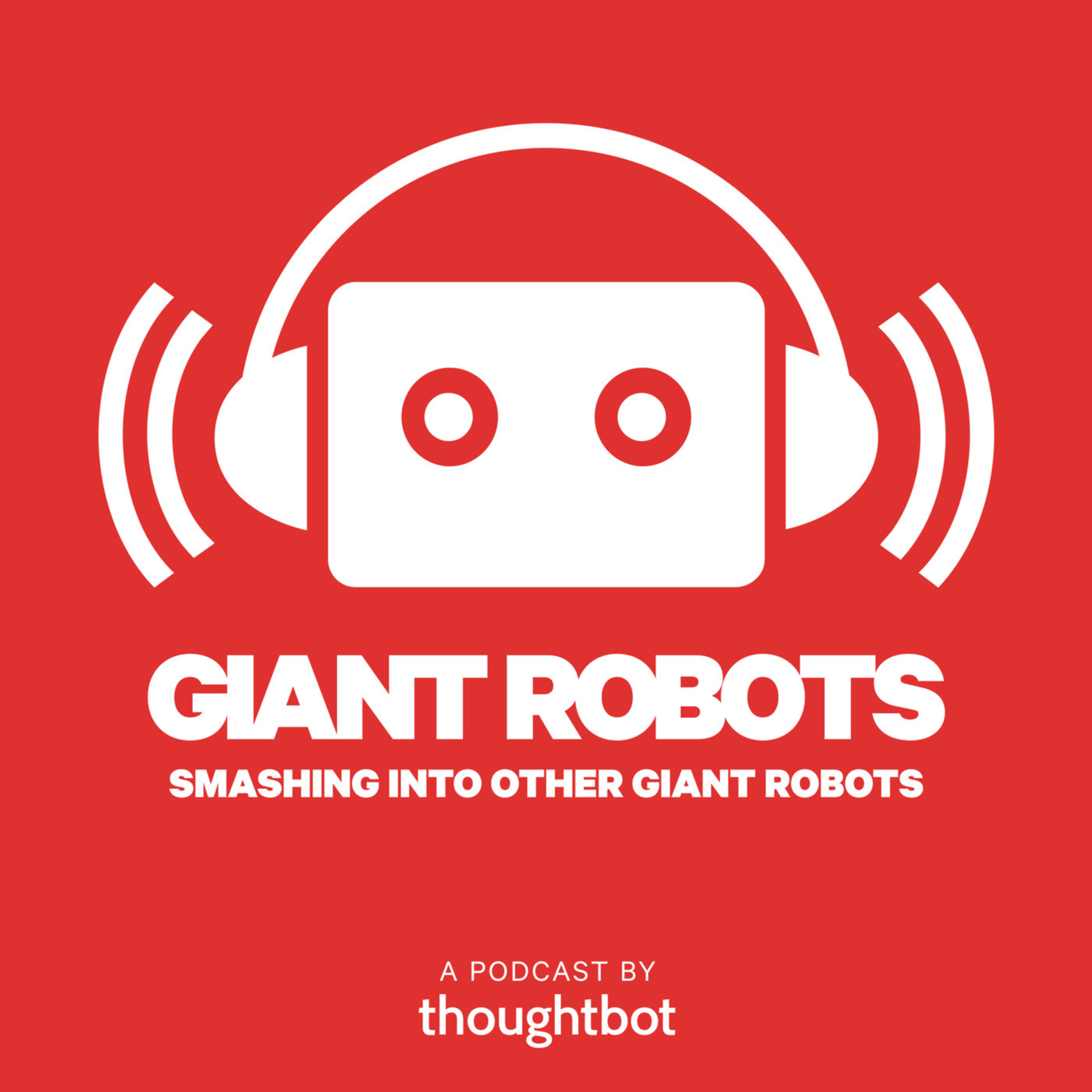Giant Robots Smashing Into Other Giant Robots
Episode Archive
Episode Archive
615 episodes of Giant Robots Smashing Into Other Giant Robots since the first episode, which aired on June 11th, 2012.
-

87: Monitoring the Bathrooms (Tony DiPasquale)
February 23rd, 2014 | Season 2 | 23 mins 4 secs
This week on Giant Robots, Ben chats with Tony DiPasquale on utilizing Arduino engineering to solve 0th world problems.
-

86: Humility and Patience (Peter Reinhardt)
February 16th, 2014 | Season 2 | 21 mins 50 secs
In this week's episode, we're joined by Peter Reinhardt, Co-founder and CEO of Segment.io. Ben and Peter discuss the product, their tech stack, the companies big pivot to Segment.io, their growth and future plans. They also discuss leaving MIT to start a company, getting along with your co-founders, nuclear reactors, hiking, and much more.
-

85: I Want These Ideas To Be Free (Max Temkin)
February 9th, 2014 | Season 2 | 40 mins 12 secs
This week, Ben is joined by Max Temkin, creator of Cards Against Humanity and Humans vs. Zombies. Max talks about his success with Cards Against Humanity and his feelings of impostor syndrome. He talks about some of his other projects including his first indie game, Humans vs. Zombies. Most recently Max had a multiplayer PC game published called Samurai Gunn. Max talks about the "open source" nature of his games. They discuss money, sustainability, kickstarter, and much more.
-

84: The Bus Number (Harper Reed)
February 2nd, 2014 | Season 2 | 46 mins 20 secs
On this week's episode, Ben talks with Harper Reed, former CTO of Threadless, former CTO of Obama for America, and currently CEO of Modest. Harper talks about management and his "cabal" of people that he likes to work with. He also discusses his experience on the campaign, healthcare.gov, and procurement laws. When asked about his playbook for success, Harper talks about networking strategies, the use of different languages for different problems, craziness, and much more.
-

83: Turning the Tables (Ben Orenstein)
January 26th, 2014 | Season 2 | 53 mins 30 secs
On this week's special episode, Chad Pytel turns the tables and interviews host Ben Orenstein. They discuss the process of running the podcast and Ben's roots in programming and computer science. Ben talks about his Vim mastery, how he got into public speaking, and his experiences speaking at RailsConf. This year Ben is organizing the live coding track at RailConf. Ben describes his strategies for learning programming, how he's getting into Clojure, and much more!
-

82: Teach all the things (Matt Knox)
January 19th, 2014 | Season 2 | 38 mins 25 secs
This week's episode features Matt Knox of Twitter. Matt is a part of Twitter's university team which teaches new Twitter recruits about the company. He works as an engineer as well in order to stay current. Matt discusses his background as an engineer, and how he got into teaching. He discusses using Storm, essentially a real-time Hadoop, for Twitter. Ben and Matt talk about the importance of keeping a portfolio as a programmer and deliberate practice routines for coding, and more.
-

81: An Agent of Change (Seth Godin)
January 12th, 2014 | Season 2 | 33 mins 41 secs
In this week's episode, Ben Orenstein is joined by best selling author, Seth Godin. Seth describes himself as an entrepreneur, a blogger, and an agent of change. They discuss art, frustration, and the endless pursuit of perfection as an artist. In his newest book, The Icarus Deception, Seth discusses seeking art in your work and looking beyond standards and production. They talk about the importance of finding connections with other artists and people who can provide meaningful feedback. They discuss several of Seth's blog posts which are linked below, and much more.
-

80: Growing Business (Josh Pigford)
December 22nd, 2013 | Season 2 | 28 mins 11 secs
This week on Giant Robots, Ben Orenstein chats with Josh Pigford about time management, entrepreneurship and farming
-

79: The Gentle Wise One (Uncle Bob Martin)
December 15th, 2013 | Season 2 | 37 mins 59 secs
This week on Giant Robots, Ben Orenstein talks with Uncle Bob Martin about functional programming, ethics, and writing.
-

78: Fancy Pants (Chris Lindland)
December 8th, 2013 | Season 2 | 28 mins 6 secs
This week on Giant Robots, Ben Orenstein talks with Chris Lindland, CEO of Betabrand.com about online fashion, self-generating product and dress-pant-sweatpants.
-

77: A Beautiful Thing (Harold Giménez)
December 1st, 2013 | Season 2 | 51 mins 16 secs
This week on Giant Robots, Ben Orenstein speaks with Harold Giménez, Heroku postgres leader, about postgres, data management, and beer brewing.
-

76: The Boutique Agency
November 24th, 2013 | Season 2 | 40 mins 51 secs
Ben Orenstein speaks with Alex Kesler, founder and CEO of inSegment about digital marketing, GTD and productivity.
-

75: Embedding Democracy (Catherine Bracy)
November 17th, 2013 | Season 2 | 31 mins 21 secs
This week Ben Orenstein interviews Catherine Bracy, Director of Community Organizing at Code for America.
-

74: Fancy Scala (Sean Griffin)
November 10th, 2013 | Season 2 | 32 mins 5 secs
Ben Orenstein speaks with thoughtbot developer Sean Griffin about scala and ruby.
-

73: Spooky Robots Haunting other Spooky Robots (Drew Neil)
November 3rd, 2013 | Season 2 | 33 mins 3 secs
Ben Orenstein speaks with Drew Neil, creator of vimcasts.org about teaching writing and workshopping vim.
-

72: Up in the Mountains (Nathan Barry)
October 27th, 2013 | Season 2 | 32 mins 39 secs
This week on The Giant Robots Podcast, Ben Orenstein chats with Nathan Barry about book writing, teaching and self employment.
